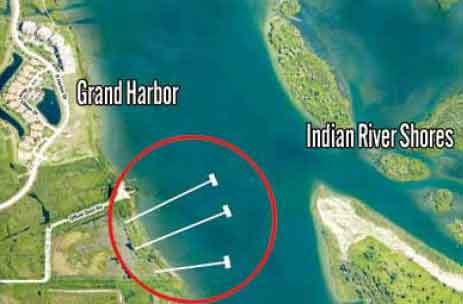
VERO BEACH — If Oculina Bank gets its way, three 6,000-square-foot waterfront homes will be built about a mile north of the Barber Bridge, each with a dock extending 350 to more than 500 feet into the Indian River lagoon, intruding on the unspoiled natural vista that stretches from the bridge north to Grand Harbor.
Should the project proceed, several acres of tidal wetlands will be filled and hundreds of pilings will be sunk in shallow water on the western shore of the lagoon where manatees are known to graze on sea grass beds.
Since 2009, Oculina has made several unsuccessful attempts to get the property permitted for development. But on Jan. 22, the Florida Department of Environmental Protection published notice of its intent to grant a permit for the houses and docks.
“Docks that length could pose a hazard to navigation,” says Ralph Monticello, director of Land Protection at Indian River Land Trust. “They could also interfere with manatee feeding areas.”
“The two main issues with really long docks like that are shading and the possibility of poisonous chemicals the wood pilings are treated with leaching into lagoon water,” says Jim Egan, executive director of the Marine Resources Council. “I have seen studies that show wooden docks like that create a dead zone around them.”
Shading is a critical issue because of potential impact on sea grass beds that are a foundational component of lagoon ecology, providing food and shelter for many marine animals. Manatees rely on the lush underwater meadows for much of their diet and the grasses act as a nursery for fish.
A study done by The Coastal and Estuarine Research Federation, a private, nonprofit non-partisan organization founded in 1971, found sea grass density is reduced by more than 40 percent in shaded areas, and the proposed docks would shade more than 5,000 square feet.
Egan says loss of wetlands is another concern with a project like this.
“The Indian River Lagoon has less wetland associated with it than any other major estuary on the East Coast of the United States, so there is a serious impact if we lose any along the shore.”
“Seventy-five percent of the seafood we eat starts life among mangroves and in wetlands,” says John’s Island resident Carolyn Stutt, a trustee of the Mangrove Garden Foundation.
The 15-acre site, was bought by Lobo Properties North Inc. for $4.1 million in October 2005 at the height of the real estate boom.
Oculina Bank, which held the note, filed notice of Lis Pendens and acquired the property from Lobo for $500,000 in 2008 after the bust.
The bank transferred the property internally from one division to another via a $100 quit claim deed in January 2012.
The bank division that now has interest in the property is part of a joint venture with an Ohio bank.
An upbeat letter from an attorney working for the bank in the permit effort cites the change of administration in the Tallahassee as an important factor in making the project, called Osprey Estates, more viable now than in the past.
“As your own contacts have confirmed, Gov. Scott’s approach, when applied at the administrative level, will foster a climate consonant with approvals of projects like Osprey Estates,” wrote Steven Geoffrey Gieseler in a letter addressed to Jeffrey Maffett, president of the board of Oculina Bank.
Scott is regarded as a poor steward of the environment by many, but a DEP spokesperson says the project has been revised and now meets environmental standards.
“When someone wants to develop a property, we look at the entire parcel and try to determine how their objectives can be met with minimal impact to the environment,” says DEP External Affairs Director Lisa Kelley.
Project opponents are not convinced.
“I am concerned about the preservation of precious tidal wetlands,” says Stutt. “If this is approved, it will set a precedent that will endanger other critically important natural areas. This project is not good for the lagoon.”
Under DEP rules, anyone who opposes the Osprey Estates development can slow the permit process by filing a petition for an administrative hearing, but the petition must be filed by March 7, according to Kelley, and it must be filed in a very specific form.
“All the details on how to file were published on Feb. 22,” she says.
Information can also be obtained from the Florida Department of Environmental Protection.



